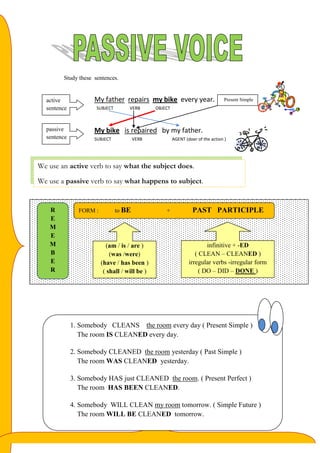
Passive voice
- 1. We use an active verb to say what the subject does. We use a passive verb to say what happens to subject. R E M E M B E R FORM : to BE + PAST PARTICIPLE (am / is / are ) (was /were) (have / has been ) ( shall / will be ) infinitive + -ED ( CLEAN – CLEANED ) irregular verbs -irregular form ( DO – DID – DONE ) Study these sentences. active sentence passive sentence My father repairs my bike every year. SUBJECT VERB OBJECT My bike is repaired by my father. SUBJECT VERB AGENT (doer of the action ) Present Simple 1. Somebody CLEANS the room every day ( Present Simple ) The room IS CLEANED every day. 2. Somebody CLEANED the room yesterday ( Past Simple ) The room WAS CLEANED yesterday. 3. Somebody HAS just CLEANED the room. ( Present Perfect ) The room HAS BEEN CLEANED. 4. Somebody WILL CLEAN my room tomorrow. ( Simple Future ) The room WILL BE CLEANED tomorrow.
- 2. TENSE ACTIVE VOICE PASSIVE VOICE PRESENT SIMPLE The teacher punishes me. The teacher punishes the boy. The teacher punishes the boys. I am punished by the teacher. The boy is punished by the teacher. The boys are punished by the teacher. PRESENT CONTINUOUS The teacher is punishing me. The teacher is punishing the boy. The teacher is punishing the boys. I am being punished by the teacher. The boy is being punished by the teacher. The boys are being punished by the teacher. PAST SIMPLE The teacher punished me. The teacher punished the boys. I was punished by the teacher. The boys were punished by the teacher. PAST CONTINUOUS The teacher was punishing me. The teacher was punishing the boys. I was being punished by the teacher. The boys were being punished by the teacher. PRESENT PERFECT The teacher has punished me. The teacher has punished the boy. I have been punished by the teacher. The boy has been punished by the teacher. PAST PERFECT The teacher had punished me. The teacher had punished the boys. I had been punished by the teacher. The boys had been punished by the teacher. FUTURE SIMPLE The teacher will punish me. The teacher will punish the boys. I will be punished by the teacher. The boys will be punished by the teacher. GOING TO FUTURE The teacher is going to punish me. The teacher is going to punish the boys. I am going to be punished by the teacher. The boys are going to be punished by the teacher. CONDITIONAL The teacher would punish me. The teacher would punish the boys. I would be punished by the teacher. The boys would be punished by the teacher, MODALS The teacher can punish me. The teacher could punish me. The teacher may punish me. The teacher might punish me. The teacher must punish me. The teacher had to punish me. The teacher shall punish me. The teacher should punish me. The teacher ought to punish me. I can be punished by the teacher. I could be punished by the teacher. I may be punished by the teacher. I might be punished by the teacher. I must be punished by the teacher. I had to be punished by the teacher. I shall be punished by the teacher. I should be punished by the teacher. I ought to be punished by the teacher.
- 3. TENSE Subject Verb Object Simple Present Active Alice corrects mistakes Passive mistakes are corrected by Alice Simple Past Active Alice broke the ashtray F thePassive The ashtray was broken by Alice Present Perfect Active Alice has answered the phone Passive The phone has been answered by Alice Future Active Alice will cook dinner Passive Dinner will be cooked by Alice In English the Passive voice is used when the action is more important than the person who did the action. Example: The old house was pulled down FORMATION OF THE PASSIVE VOICE The object of the active sentence becomes the Subject of the Passive sentence The finite form of the verb is changed (to be+ past participle) The subject of the active sentence becomes the object of the passive sentence.